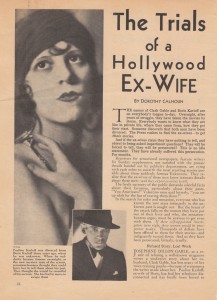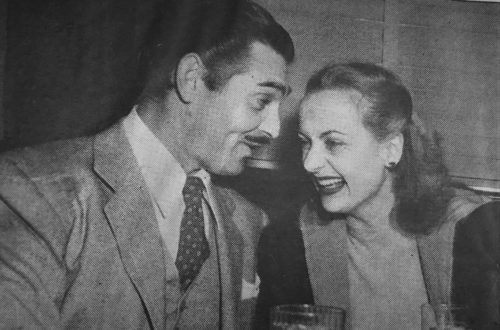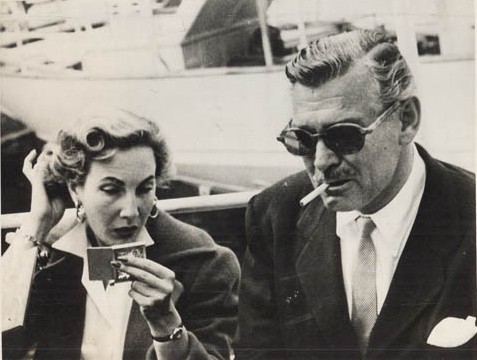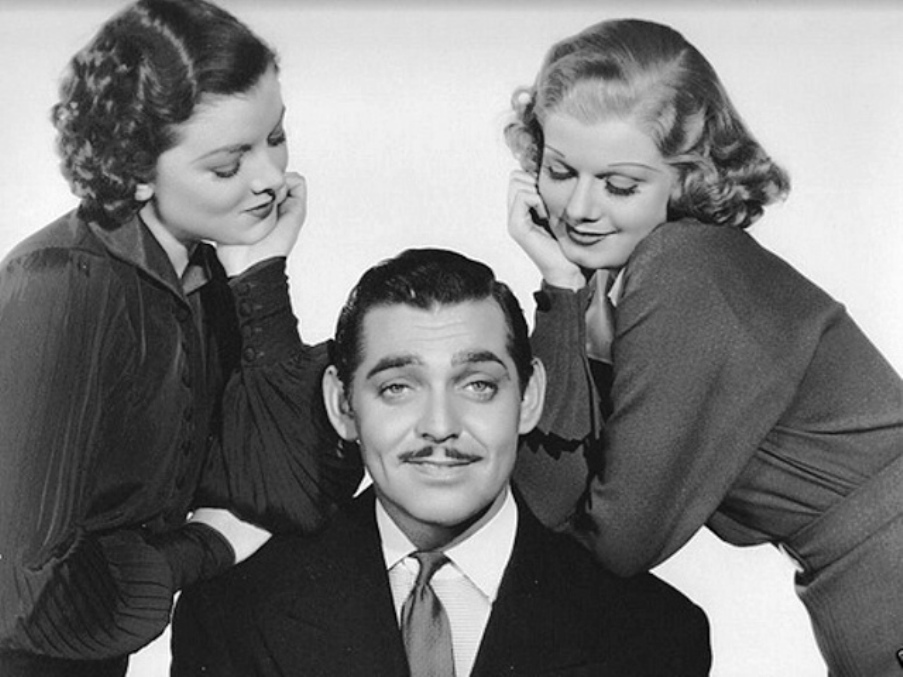{New Article} 1932: The Trials of a Hollywood Ex-Wife
This piece is about Clark and Boris Karloff’s ex-wives and how they are “persecuted” by the press to tell dish about their favorite ex-husbands. I was delighted to come across this article because my very dearest friend is a classic horror movie freak and I was quite happy to be able to say to her, “Here’s an article for the both of us!” as Boris Karloff is to her as Clark Gable is to me.
Onto the article. Clark’s only ex-wife at this time was Josephine Dillon, a matronly acting coach 17 years his senior. He was newly married to Ria Langham.
The story of Josephine Dillon’s persecution by yellow journalism is almost incredible. In a civilized community, with policemen pacing the Boulevard not a hundred feet away, she was threatened and browbeaten, terrified and insulted. In her inexperience, she trustingly admitted these wolves in writers’ clothing into her plain, prim, clean little living room. But her gentle answers to their questions, her mild little reminiscences of hours of hard work with Clark Gable, and her generous praise of him were not what they were looking for, not what they wanted.
They tried devious and diabolically clever ways to get their stories. Some of them—of the feminine gender—sympathized with her disarmingly, a process known as “taking down their back hair.” Others tried to trap her into statements that would lend sensational color to their articles. One seasoned newspaper man, who had exhausted every trick in his repertoire to get her to reveal some of the secrets of her married life, decided to arouse her anger against Clark.
“Look at yourself!” he shouted. “A poor, miserable woman, living in this wretched shack, while he has a fine apartment! Look at your shabby clothes! Look at your shoes!” He pointed a scornful finger. “How do you feel when he rides by in a limousine? Why, I’ll bet you haven’t the price of a square meal in the house this minute!”
But for all her quiet voice and ladylike ways, Josephine Dillon is a clever woman. “Oh, I’m not so poor I can’t buy a ticket to see a Clark Gable picture!” she answered, smiling.
I find this article a bit odd. Odd and rather funny. If you are sick of the press stalking you, why talk to them at all? Why be interviewed by a magazine ABOUT how you are being hounded by the press?
And I would also like to add that I sincerely doubt Josephine had much dirt to spill, anyway. According to both her and Clark, the marriage was in name only and they never slept together.
Without friends to trust, without protection, or money to hire lawyers, she at last turned for help to the studio where Clark Gable was working.
“There was a writer for a newspaper syndicate who came to me,” She relates. “He didn’t ask for a story. He had a story already—had obtained it in New York. All he wanted was for me to admit that his story was true. I denied it, over and over. He was so violent I was terrified. He went away, and came back the next evening—late. I told him again that his story wasn’t true. Finally, he looked at me. ‘Miss Dillon,’ he asked, ‘your father was a lawyer, wasn’t he?’ I said, ‘Yes.’ He looked at me bitterly and said, ‘I thought so. Because you are the most artful dodger I’ve ever met. But how long do you think you can get away with it?’
“After he had left, I couldn’t sleep. The next day, I went to the studio and told them they must protect me. I told them that I had never said anything unkind about Clark and that I never intended to do so. But I couldn’t stand this persecution any longer. Since then they have dealt with the people who came to interview me.”
Please don’t waste your tears on poor threatened Josephine. She actually wrote Louis B. Mayer, head of MGM, a long letter in which she called Clark “an ungrateful chiseler” who had used her. She said that if she did not receive some sort of compensation, she would be “forced” to go to the press. The result of this was Mayer deducting $200 a month (not a small amount, in those Depression-era days) from Clark’s paychecks and sending it to Josephine. Clark was not pleased. So, she may have been threatened by the press, but the reason she wouldn’t release a story was not because she was such a good and honest woman. It was because she was being paid to keep her mouth shut.
I’m not sure when the payments to Josephine stopped but by 1955, she was in need of money and publicity again and sold her story to the tabloid mag Confidential. (Read it here in the Article Archive). In it, she is pictured in her renovated barn of a home and complains about Clark having money and not giving her any and how he is her “creation.” She does neglect to mention that Clark owned the house that she lives in rent-free. Details, details…
The ex-Mrs. Karloff, a gal named Pauline (which is weird because when I looked up Boris, none of his six wives seemed to be named Pauline?) is also hounded and goes to Josephine for advice in the last part of this article.
After “Frankenstein” had set the public to talking about the new mystery man of the screen, Boris Karloff, Josephine Dillon Gable had a caller one day—a young and pretty woman whose card bore the name, “Pauline Karloff.” She told her that she was a dancer, an artist, and the ex-wife of the new screen star.
“Reporters are after me to tell them sensational stories about Boris,” she said. “I knew that you must have been bothered the same way—so I came to ask you what I should do to stop them.”
No motion picture scene that movie-star Gable or movie-star Karloff is ever asked to make can be more dramatic than that meeting of these ex-wives in Josephine Dillon’s plain little living room. There they sat, two women who had known and still knew the pinch of poverty, discussing earnestly how to protect the men they had married—and lost.
Read the article in its entirety in The Article Archive.



